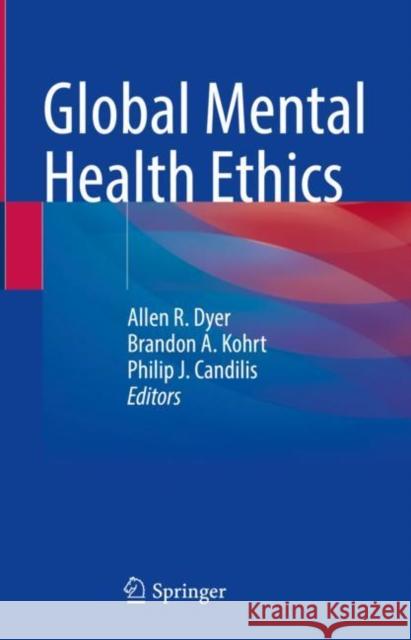Global Mental Health Ethics » książka



Global Mental Health Ethics
ISBN-13: 9783030662950 / Angielski / Twarda / 2021 / 402 str.
Global Mental Health Ethics
ISBN-13: 9783030662950 / Angielski / Twarda / 2021 / 402 str.
(netto: 458,96 VAT: 5%)
Najniższa cena z 30 dni: 462,63
ok. 22 dni roboczych.
Darmowa dostawa!
Preface – Mental Health as a Human Right – Sorel
Introduction
1. Ethical Concepts and First Principles “Overview – The Lens of Ethics” - Allen
2. History of Global Mental Health and Ethical Debates (medical anthropology perspectives on World Systems Theory; Singer, economic framing) - Brandon
Diagnosis, Culture, and Identity
3. Diagnosis, Cultural Imperialism, and Stigma – what are the implications of cross-cultural use of diagnostic labels, local labels, (ethnicity and labels)
4. Economics and Disability – a critique of the capitalist economic model of health and debates related to how QALYs and DALYs are developed and calculated
5. Whose treatment gap? – the need to identify and label suffering to justify intervention, action, ‘interference’, gap by what standards,
6. Religion, Spirituality, and Healing - Griffith
Global Mental Health Services
7. Pharmacology, Pharmaceutical Companies – Access to pharmaceutical, under-treatment, over-treatment, etc.8 Safety of non-specialist care & ‘Free’ Labor:– harm to beneficiaries, harm to providers, the female workforces in global mental health – ethics of uncompensated care
9 Involvement of Service Users and Family Members in the framing, design, delivery, and language of mental health and mental health care
10. Ethics of traditional healing, religious healing, spiritual approaches – Griff
Pathologizing Adversity: Torture, Trauma, and Social Determinants
11. Social Determinants and Suffering – framing social problems and psychiatric problems, e.g., gender-based violence, poverty, etc.
12. Humanitarian Settings and Crises – the ethics of mental health in emergency settings (Morse and al Uzri)
13. Ethical issues of mental health and terrorism/radicalization
Mental Health and the Law
14. Legal/Ethical Issues – interface of mental health, ethics, and the law – unifying theories professionalism and human rights – Candilis15. Human Rights and Mental Health Care – Issues raised by Cratsley regarding the ethical assumptions, individualism, autonomy, etc.
16. Psychiatric illness as proxy for human rights violations on individual and population levels - e.g., Physicians for Human Rights work with psychiatric diagnoses, asylum system and psychiatric diagnoses; using pain and psychiatric illness as proxy for human rights violations – Polatin and Zemenides
Research and Rights
17. Research tools cross-cultural applications and challenges18. Clinical Trials and ethical issues/DSMBs, etc.
19. Ethics in humanitarian crisis research & ethics with vulnerable populations – children, minority groups, displaced groups, non-citizens, etc.20. Data ownership, technological and biological data collection – access, observation, and autonomy
Training, Capacity Building and Ethics
21. Power differentials in agendas and expectations for LMIC capacity building – Crick Lund
22. Addressing power and ethics for trainees from HIC institutions
Epilogue: Global Health and the Health of the Planet
Allen R. Dyer, MD, PhD
Professor of Psychiatry and Behavioral Sciences
Vice-chair for Education
The George Washington University
2120 L Street NW, Suite 600
Washington, DC 20037 USA
Brandon Kohrt, MD, PhD
Charles and Sonia Akman Professor of Global Psychiatry
Associate Professor of Psychiatry and Behavioral Sciences and Global Health
Director, Division of Global Mental Health
The George Washington University
2120 L St NW, Suite 600
Washington DC 20037
Philip J. Candilis, MD, DFAPA
Professor of Psychiatry, George Washington University School of Medicine
Director of Medical Affairs
Co-Director, Forensic Psychiatry Fellowship
Saint Elizabeths Hospital
DC Department of Behavioral Health
1100 Alabama Avenue SE
Washington DC 20032
This volume addresses gaps in the existing literature of global mental health by focusing on the ethical considerations that are implicit in discussions of health policy. In line with trends in clinical education around the world today, this text is explicitly designed to draw out the principles and values by which programs can be designed and policy decisions enacted. It presents an ethical lens for understanding right and wrong in conditions of scarcity and crisis, and the common controversies that lead to conflict. Additionally, a focus on the mental health response in “post-conflict” settings, provides guidance for real-world matters facing clinicians and humanitarian workers today.
Global Mental Health Ethics fills a crucial gap for students in psychiatry, psychology, addictions, public health, geriatric medicine, social work, nursing, humanitarian response, and other disciplines.
1997-2026 DolnySlask.com Agencja Internetowa
KrainaKsiazek.PL - Księgarnia Internetowa









